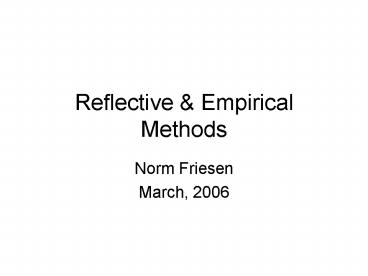Reflective
1 / 20
Title: Reflective
1
Reflective Empirical Methods
- Norm Friesen
- March, 2006
2
Reflective Empirical Methods
- Reflection thinking about the question and the
phenomenon in a way that opens up its various
aspects and dimensions. - Empirical sources of vicarious experience
(from Max van Manen, www.phenomenologyonline.com
)
3
Reflective Empirical
- Reflective
- Thematic, Guided Existential, Collaborative,
Linguistic, Exegetical, Hermeneutic Interview - Empirical
- Describing, Gathering, Interviewing, Observing,
Fictional, Imaginal(from Max van Manen,
www.phenomenologyonline.com)
4
Thematic Reflection
- Themes
- the constellations that make up the universes of
meaning we live through. By the patterns and
light of these themes we can navigate and explore
such universes. - Themes are heuristic. They are means "to get at"
the phenomenon we are addressing.(from Max van
Manen, www.phenomenologyonline.com)
5
Reflection Guided Existential
- Lived Time speeds up, slows down e.g. of bank
machine experience - Lived Space we are the space were in e.g. of
different architectural spaces - Lived Body Body as anchorage, way of being, as
object of observation - Lived Relation relational distance,
atmosphere, intensity, disconnection(from Max
van Manen, www.phenomenologyonline.com)
6
Linguistic Reflection
- Etymological histories of words often have rich,
life-world significances (experiential residue) - Conceptual understanding differences in meaning
in words expressions. - E.g. Dog
- (from Max van Manen, www.phenomenologyonline.com)
7
Dog-eat dog, underdog, Top dog, bottom dog
8
lap dog teacher's pet
9
Cur, pariah, bitch, dogsbody "you dirty dog,
flea bag mongrel, mutt, gone to the dogs
10
Dog tired
11
Exegetical
- critical, sensitive, and creative reading of
related texts - Prevailing theories and constructions as a foil
for what you are searching for in
phenomenological research - Prevailing theories and constructions can also
point to phenomenological insights - Creative, Accidental, Serendipitious sources
(video example)(from Max van Manen,
www.phenomenologyonline.com)
12
Other forms of Reflection
- Collaborative as in this session, with others
working together - Insight-cultivating from philosophy and other
sources(from Max van Manen,
www.phenomenologyonline.com)
13
Phenomenological Interview
- an interpretive conversation wherein both
partners reflectively orient themselves to the
interpersonal or collective ground that brings
the significance of the phenomenological question
into view - Keep the question open(from Max van Manen,
www.phenomenologyonline.com)
14
Phenomenological Interview
- Not structured can list general questions or
beginning script - Close to the phenomenon, if possible
- Ask for reminiscences speculation
- Steer away from explanation
- ASK what did you feel not what did you think
- Comfortable location follow-up interviews
15
Empirical Methods Describing
- start with your own experience
- the patterns of meaning of one's own experiences
are also the possible experiences of others, and
therefore may be recognizable by others - (from Max van Manen, www.phenomenologyonline.com)
16
Gathering
- Describe the experience as much as possible as
you live(d) through it. - Describe the experience from the inside, as it
were-almost like a state of mind - Focus on a particular example or incident of the
object of experience - Try to focus on an example of the experience
which stands out for its vividness, or as it was
the first time(from Max van Manen,
www.phenomenologyonline.com)
17
Observing
- Close and participatory observation
- E.g. participate in the childs world
- Similar to the attitude of the author who is
always on the look-out for stories to tell,
incidents to remember(from Max van Manen,
www.phenomenologyonline.com)
18
Imaginal experiences
- Non-discursive artistic material as transformed
experience - E.g. experience of space in nature(from Max
van Manen, www.phenomenologyonline.com)
19
(No Transcript)
20
(No Transcript)































